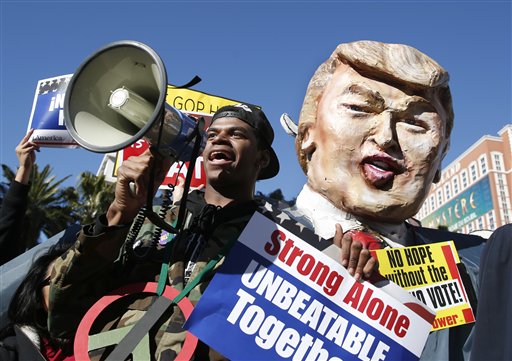I am not a liberal
We need to break the stigma of labels, one step at a time.

Protestors carrying a likeness of Republican presidential candidate Donald Trump gather outside the Venetian Hotel & Casino before the CNN Republican presidential debate on Tuesday, Dec. 15, 2015, in Las Vegas. (AP Photo/John Locher)
In my opinion, a sign of maturity is when you can admit that your views have changed.
Many people feel obliged to stick to the opinions they’ve held for years, whether it’s due to fear of ridicule or judgement from their friends and family. Once an individual becomes entangled in a web of labels, it can be very hard to get out.
I’ve experienced this first hand. My family and friends are all extremely liberal, leading me to lean in that direction as well. Now, I do agree with a good portion of democratic policies, but the issue lies within the fact that I never bothered to check the opinions of the other side.
When getting my news, MSNBC was my source of choice. Every day, for as long as I can remember, my mom would turn that channel on before school. To this day, she still does.
I wrote an article about this same issue during my sophomore year. My message was all about the importance of avoiding bias news and one-sided opinions, and yet, I didn’t follow my own advice.
My article published on October 27, 2017 – over two years ago today – read as follows:
“Although the bigger sources (CNN, MSNBC, FOX) aren’t changing their bias anytime soon, local journalists can attempt to write unbiased reports of the news. To the highly opinionated people, it might sound like a struggle to stay neutral, but simply writing the facts of the situation can help clear up blurred lines. At the Knight Crier, there’s a certain section for those who wish to write opinionated articles, and there’s a section for those who simply wish to report the news. Therefore, people can know what’s bias and what’s not.
Don’t get me wrong, bias can be good. It provides an alternative perspective on situations, and I’m always curious to see other people’s take on something that’s going on. There’s no problem with writing highly opinionated articles – the problem is that those articles are the ones getting to people the most. For a person who chooses to remain uninformed, a biased interpretation of a particular situation could be the only coverage they receive of any event, but in that case, the individual and the news source are equally to blame.”
Great, now how do you go about this?
You should start by watching multiple news channels – not just one. Your intake of news and how warped it is essentially determines what you believe. I let a plethora of biased information seep its way into my brain, unaware of what it was doing to me.
Another factor that contributed to my change in views was communication between my peers and I. My bias had become so strong that my conservative friends avoided talking to me about politics all-together, thinking that I would judge them. Changing this notion for them involved me putting my pride aside and admitting that yes, I was judgemental. Opening this line of honest communication paved the way for a multitude of informative and interesting conversations, ones that opened my eyes to new opinions and perspectives.
My central message here is as follows: I’m not as liberal as I used to be. I wouldn’t consider myself attached to one party or another. My opinions regarding the political climate, including issues that I’ve written about during my time on the school newspaper, have altered to fit my open mind.
Therefore, as I continue to write politically-charged articles, don’t prejudge them as fitting to a certain party, label, or viewpoint. Take them in for what they are: my personal beliefs that don’t represent one affiliation or another. Breaking the stigma of labels is the first step.


Christiana Noll • Nov 5, 2019 at 7:31 pm
This is awesome. I myself am surrounded by liberal friends and although I’m not hardcore right or left, I feel like an outcast and judged if I speak my mind about politics–so I don’t. It’s great how you realized there’s more than one side, and I hope there are others like yourself who learn this also.